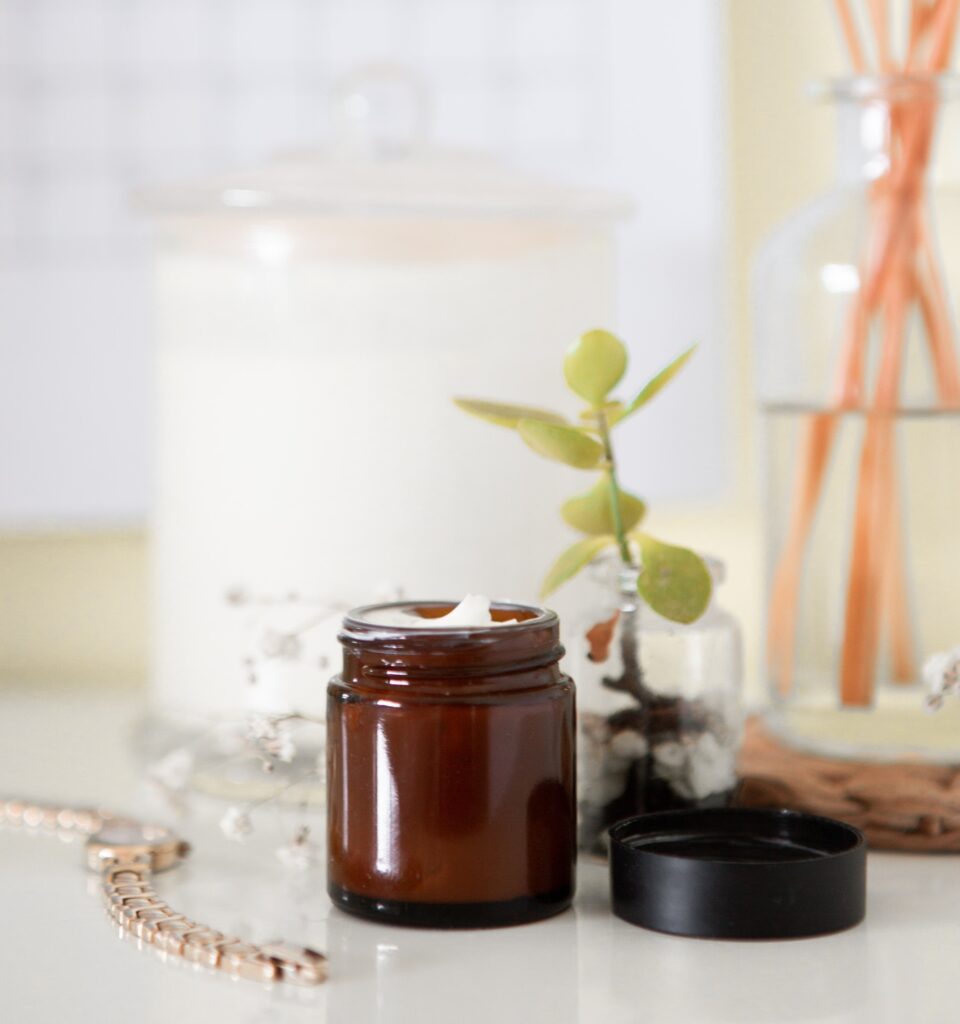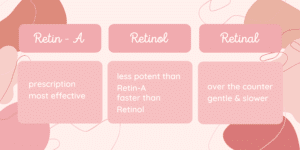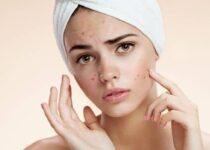Retinoids: Retin-A, Retinal And Retinol, Should You Use It?
Retinoids: The Royal Family of Vitamin A
Everyone’s on the buzz about this trending ingredient. Many people have made reviews and articles about this. But are you still confused about what’s the difference between retinoids, retinol, retinal, and Retin-A? That wouldn’t be surprising since the massive popularity of these ingredients is present in various anti-aging products, many people want to find out how they differ from one another. Let’s get to know what they are, and maybe you can find one that might suit you!

What are Retin-A, Retinal and Retinol?
Vitamin-A has been known for its use in anti-aging remedies, improving wrinkles, hyperpigmentation, acne, and boosting of collagen. Retinol, retinal, and retin-A are forms of vitamin-A derivatives which are called retinoids.
Retinoids are under the family of vitamin A, the royals of active ingredients. This vitamin A derivative has been proven to be the most researched and most effective in treating acne. It’s been buzzing around for quite some time, but lately, it’s most talked about for its miraculous powers in anti-acne and anti-aging.
To give you a bit of history, retinoid was mainly used for treating acne. However, experts have discovered other benefits such as anti-aging and a brighter complexion. They noticed that patients who were using retinoids did not only cleared up from acne, but also observed plump, and younger-looking skin from them. Today, there is news everywhere that helps in the appearance of pores, evens skin texture, hyperpigmentation, and sun damage.
Retinoid is a prescription drug that is issued by your dermatologist. It is important to know that using prescription retinoids brings severe effects to your skin when inappropriately used. Consult a dermatologist first so that they can give you proper instructions in using a retinoid.
Downsides Of These Ingredients
There’s an adjustment period where your skin will undergo the risk of becoming worse before becoming better. This is why you should consult a dermatologist first so that you will be guided on how to deal with these side effects:
- Dryness
- Flaking
- Redness
- Irritation
- Breaking out/ Purging
- Inflammation
Three Prominent Kinds Of Retinoids
- Tretinoin –The King of All Retinoids
This is the most researched retinoid, and it has been proven effective on the skin. It works on a cellular level and has been FDA-approved that it is effective in reversing skin aging. This has become the gold standard in the world of anti-aging. It can lessen and soften the appearance of wrinkles, fine lines, and dark circles. Usually, it is prescribed by a dermatologist along with the instructions tailor-fit for your skin condition.
- Adapalene
This is a fairly new medication, more like a younger sibling of tretinoin. Most people can tolerate this better than tretinoin. Unlike tretinoin, adapalene has a lesser risk of irritation, and the chances of them occurring is lesser. You will still undergo the adjustment period. However, there are a few people who use adapalene, and they didn’t get to experience the side effects.
- Retinol
A more gentle type of retinoid with much lesser adjustment periods as compared to tretinoin and adapalene. Since it is gentle, results will come in slower than the other two. This is perfect for people who are not looking for immediate results, who just want to boost their skin condition. It is present in a lot of skincare products. Most commonly found in serums but you can also find moisturizers and eye creams that contain retinol.
How Does Retinol Work?
Your body will need to convert retinol with two steps :
- From retinol, it will become retinaldehyde and then
- It will become retinoic acid, which is the form that your skin will benefit from
This will affect how effective it will be to your skin since your skin might be slower or faster in converting retinol. Tretinoin is already a retinoic acid, which is why your skin will absorb it faster, getting immediate results.
Retin-A vs. Retinol vs. Retinal: Which One Is The Right For You?
Right now you must be wondering which one of these will be useful for you based on the benefits they offer. But you need to know that when it comes to the differences between retin-A, retinol, and retinal, it all comes down to the potency and function each has.
What Is the Function Of Retin-A, Retinal, and Retinol?
Retin-A, retinal, and retinol differ in the concentration of the active ingredients known as retinoic acid, which helps in cell turnover. Retin-A is the prescription strength of retinoic acid. It’s usually prescribed only for good reason as patients require guidance in choosing the right molecule, the right strength, and the right formula. Retin-A much stronger than retinal and retinol.

Due to its strong potency, it is known to be effectively strong and thus requires a prescription. Retinal is less potent than Retin-A but nonetheless more potent than retinol is. Retinal is clinically proven to work up to 11 times faster than retinol. Usually, retinol is over-the-counter since it’s essentially less potent than retin-A and retinal. Retinol goes through two phases before it gets converted to retinoic acid in a body, ultimately making it less potent.
Therefore, retinol is less potent than retinol and Retin-A and can be purchased from over-the-counter skincare products. Retinol is thus, less effective compared to the other two. You will have a slower result if retinol is used.
Skin Benefits Of Retinoids
- Anti-aging
Penetrates deep into the skin to promote collagen production. Your epidermis (surface of your skin) will be thicker, meaning firmer, bouncier, and soft texture. Stimulate natural skin elements to produce more to improve the overall look of skin.
- Anti-acne
Exfoliates the skin, unclogs the pores, regulates sebum production, and removes dead skin cells and bacteria. Treats acne deep down the skin and heals acne scarring. Minimizes the recurrence of acne, for better-looking clearer skin.
- Skin Brightening
Evens out stubborn dark spots, sun spots, sun damage, and hyperpigmentation due to UV rays and prior skin conditions.
If you want to use vitamin A, you must stick on to these:
- Always Use Sunscreen
Retinoids make your skin more sensitive to the sun. Retinoids and the sun don’t work well with each other. Even if you’re not yet planning to use retinoids, always apply sunscreen diligently.
- Don’t Use If You Are Pregnant Or Breastfeeding
Retinoids can give a negative side effect during pregnancy or on lactating moms. Consult your ob gyne first.
- Use At Night
Since retinoids and the sun are polar enemies, using retinoids at night will be much better. They work well at night, without the interruption of UV rays.
- Be Ready For Long Term Commitment
There is no shortcut for clear skin. It takes a lot of time and effort! Your skin needs time to adjust and one month of using retinoids will not do. You have to observe your skin for at least three months.
- Use It Consistently
Try not to skip if you really want to see results. Be consistent in following your dermatologist’s guidelines.
If you want better results, relying on the product itself prevents you from experiencing the full benefits of this product. Applying it alone is not enough, to get better results, you also have to change your lifestyle. You have to stop eating and drinking toxic food which forces your body to release toxins from inside out. And also be conscious of your sugar intake, considering that eating foods with a high amount of sugar is bad for your health.
You also have to sleep early to allow your body to rest, which then enables your cell to regenerate and replenishes different parts of your body. The most important thing of all is to always drink water. Humans are approximately 60% water, the brain and heart are composed of 73% water, and the lungs are about 83% water. This means that it is really important to rehydrate every hour.
FAQs
- When is the right time to start using retinoids?
Dermatologists recommend using in your late 20s – early 30s. If your younger and you have problematic skin conditions, there can be considerations so better yet consult your dermatologist.
- How do you start incorporating retinol into your skin care routine?
For prescription retinoids, consult a dermatologist. For over-the-counter, start with the lowest of lowest concentrations, preferably HPR or bakuchiol. Use it at night. 1-2x a week and always monitor progress.
- Are there any alternatives?
Yes, and you can check out these two ingredients.
Hydroxypinacolone Retinoate (HPR)
The newest and most gentle, quite recent so there are not many available studies.
Unlike the other three, this does not require conversion at all. It is because HPR is a retinoic acid ester which means your skin can easily absorb it. A study by Grant Industries showed a significantly lower irritation than using retinol.
Bakuchiol
Better known as a `Natural Retinol`. A plant-based version of retinoic acid, extracted from the babchi (Psoralea corylifolia) plant. It claims to have similar effects to retinoic acid, without the harsh side effects of retinoic acid. It contains antioxidant, anti-bacterial properties, and anti-inflammatory. It inhibits collagen breakdown and promotes collagen production.
A comparison study was conducted, and it showed that bakuchiol has significantly lower irritation than retinol. It said that it would work well together with retinoids and salicylic acid.
Why Are The Ingredients Seldom Found In Korean Skin Care?
Despite the benefits of retinoids, most Korean skin care products use less of those ingredients. Are you wondering why? Because retinoids have the tendency of causing irritation and peeling off the skin. Therefore, it is advised that you use retinoids when you really need to use them. And before the use of retinoids, it is always advisable to consult your doctor so as to determine which type of vitamin A derivatives that your skin requires.
Korean skin care emphasizes hydration, rejuvenation, sun damage reversing anti-aging, the industry prefers using botanical or natural ingredients in their product formulations, such as licorice root extract, aloe vera, and Centella Asiatica.
These ingredients are gentler than retinoids, and additionally, they don’t cause skin irritation, unlike retinoids. For example, during the initial period of introducing retinol into the skincare routine, you will most likely experience skin dryness, redness, burning, and flaking.
It will take for your skin to fully adjust to retinoids. However, people with sensitive skin won’t be able to do that because they can’t tolerate and get used to retinoids at all.
That’s why the majority of Korean skin care products avoid using retinoids since Korean skin care is not a fan of harsh ingredients and places its main focus on providing the skin with nourishment and hydration. Also, applying sunscreen diligently is more emphasized. Whatever age group you are, sunscreen is a must wherever you go, even if you’re just at home so you can combat anti-aging problems.
In conclusion, retinoids can cause skin irritation, burning, itching, redness, and at times peeling of the skin, and it is advisable to use them only when your skin requires it. These vitamin A derivatives are used mostly for improving fines lines, getting rid of pigmentation, boosting collagen, and improving acne conditions.
I’ve mentioned this many times already, but you must consult a dermatologist first when you want to use any vitamin A derivatives. Your skin will get worse first before getting better. It takes a lot of patience in achieving your skincare goals. Remember, it doesn’t happen overnight ladies!


